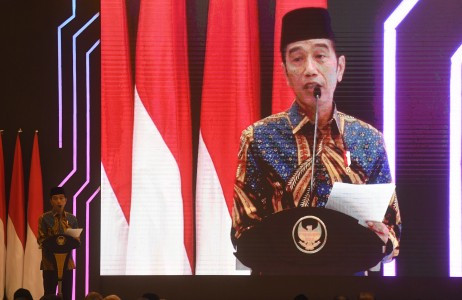Popular Reads
Top Results
Can't find what you're looking for?
View all search resultsPopular Reads
Top Results
Can't find what you're looking for?
View all search resultsJokowi launches master plan for sharia economy
The master plan sets out four main strategies aimed at transforming the country into a net producer instead of simply a market for halal goods and services.
Change text size
Gift Premium Articles
to Anyone
P
resident Joko "Jokowi" Widodo launched on Tuesday the country's first master plan for a sharia economy for implementation from 2019 to 2024.
The master plan sets out four main strategies aimed at transforming the country into a net producer instead of simply a market for halal goods and services.
The strategies are to empower Indonesia's halal value chain by focusing on the country's most competitive sectors, such as food and beverages and fashion, and strengthen the presence of the sharia financial sector as a capital provider to halal businesses.
Read also: Indonesia to launch Sharia Economy Masterplan in May
The strategies are: enhance the role of micro, small and medium enterprises (MSMEs) as the prime mover of the value chain and cooperate with e-commerce platforms to promote Indonesia's halal goods and services.
"One of the main keys to achieving our goal lies in our identity as [the country with] the world's largest Muslim population, in this sharia economy," Jokowi said during the launch at the National Development Planning Agency (Bappenas).
Despite being a Muslim-majority country, Indonesia is only the 10th largest exporter to Organization of Islamic Cooperation (OIC) countries at US$7.6 billion in 2017, lagging behind non-Muslim majority countries like Brazil, the United States and India.
On the other hand, 36 percent of domestic consumption in 2017 was halal goods, Bappenas head Bambang Brodjonegoro said, pointing out that a large proportion of those goods were imported.
"Our final goal from this master plan is to transform halal consumption into investments [in the halal industry] and to change our imports of halal goods into exports," Bambang said at the launch. (bbn)










